外研版(2019) 必修第一册 Unit 2 Exploring English Starting out Understanding ideas 课件(共21张PPT)
文档属性
| 名称 | 外研版(2019) 必修第一册 Unit 2 Exploring English Starting out Understanding ideas 课件(共21张PPT) |
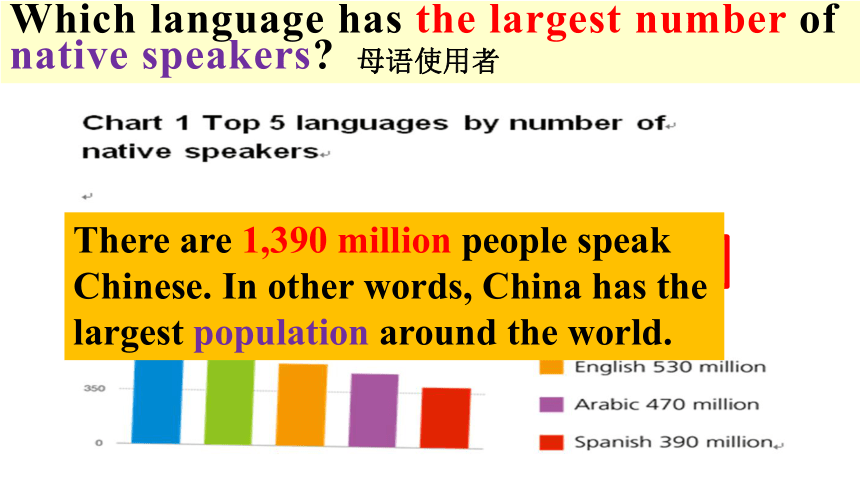
|
|
| 格式 | pptx | ||
| 文件大小 | 8.6MB | ||
| 资源类型 | 教案 | ||
| 版本资源 | 外研版(2019) | ||
| 科目 | 英语 | ||
| 更新时间 | 2022-09-23 21:32:07 | ||
图片预览

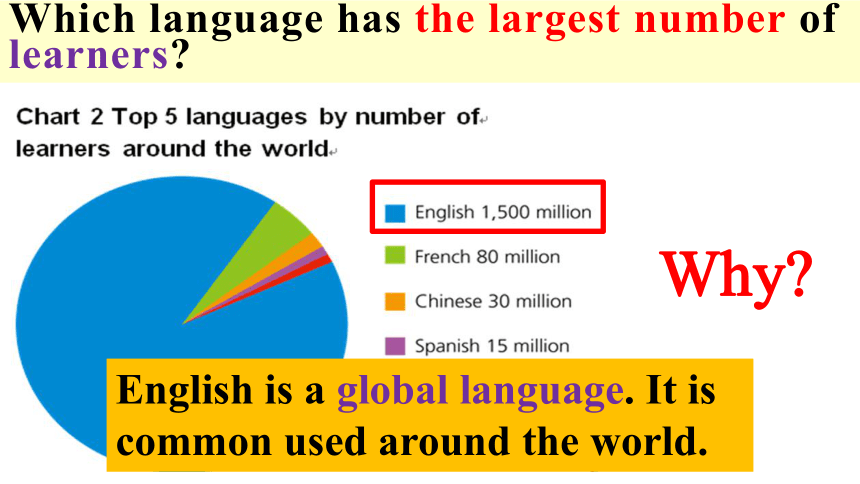
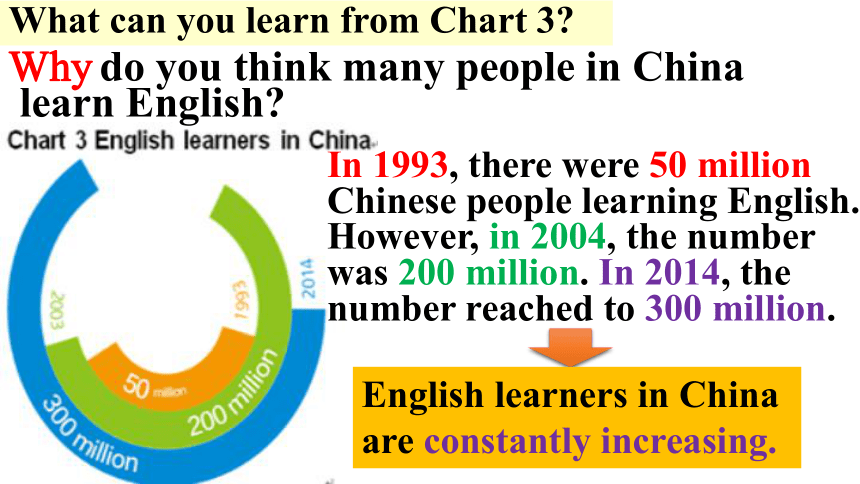
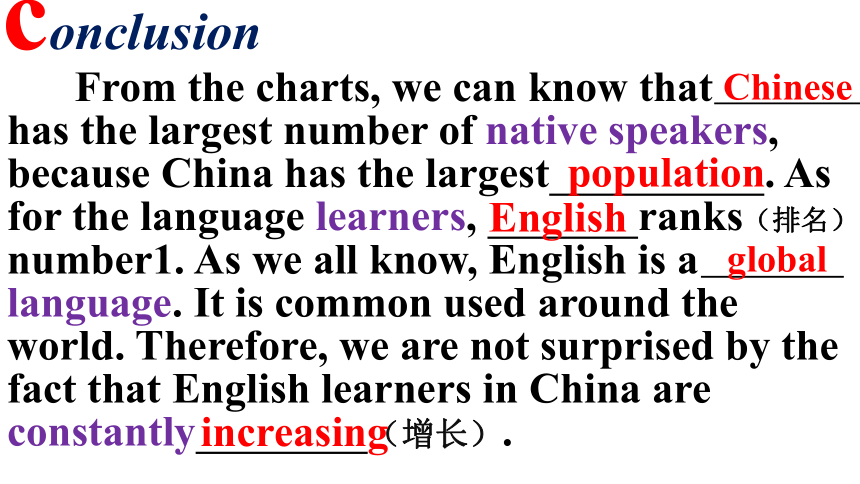

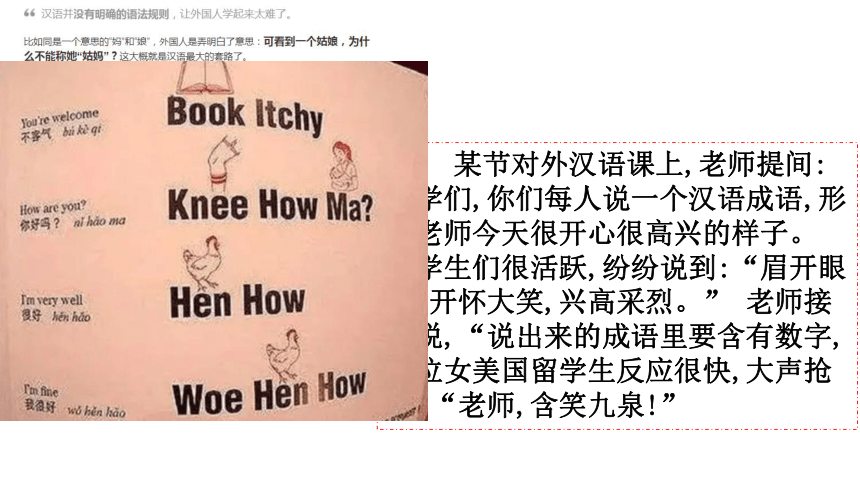
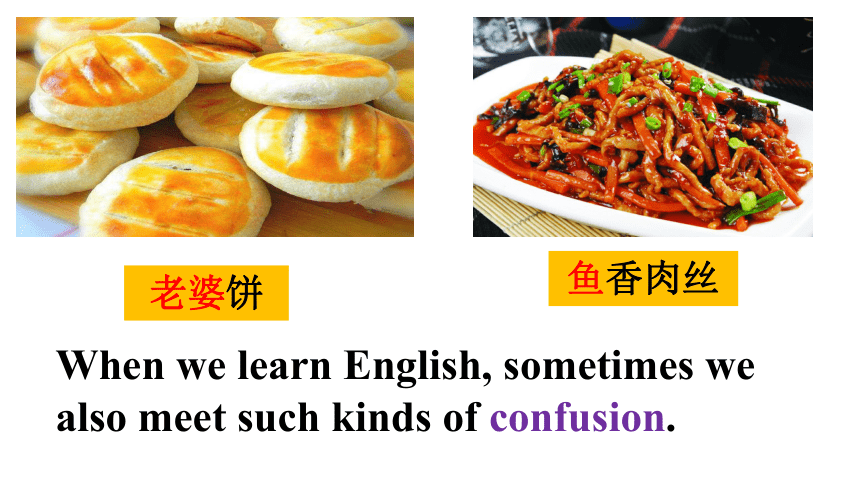
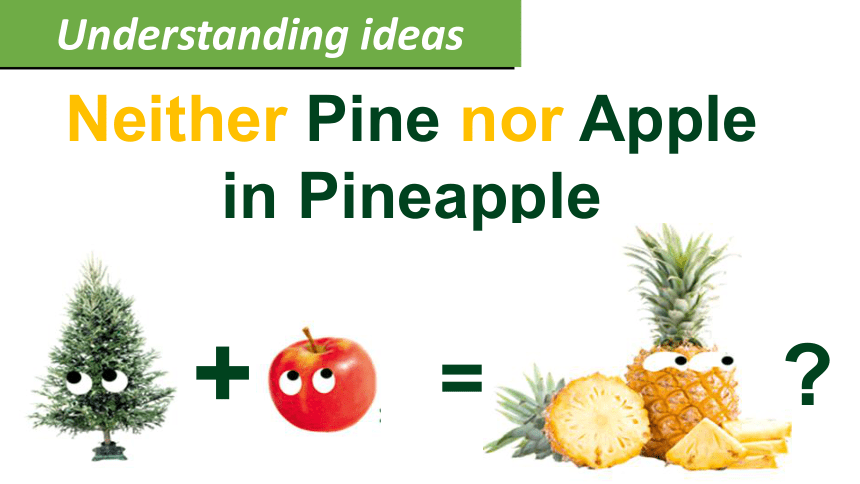
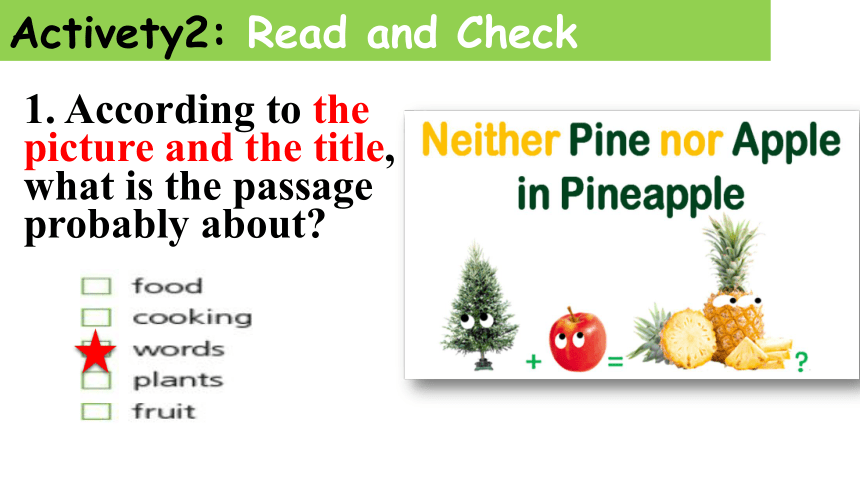
文档简介
(共21张PPT)
Which language has the largest number of native speakers
母语使用者
There are 1,390 million people speak Chinese. In other words, China has the largest population around the world.
Which language has the largest number of learners
Why
English is a global language. It is common used around the world.
What can you learn from Chart 3
In 1993, there were 50 million Chinese people learning English.
However, in 2004, the number was 200 million. In 2014, the number reached to 300 million.
English learners in China
are constantly increasing.
Why do you think many people in China
learn English
conclusion
From the charts, we can know that has the largest number of native speakers, because China has the largest . As for the language learners, ranks(排名) number1. As we all know, English is a language. It is common used around the world. Therefore, we are not surprised by the fact that English learners in China are constantly (增长).
Chinese
English
population
global
increasing
Chinese learners around the world are constantly increasing too.
cultural confidence
文化自信
某节对外汉语课上,老师提间:同学们,你们每人说一个汉语成语,形容老师今天很开心很高兴的样子。“学生们很活跃,纷纷说到:“眉开眼笑,开怀大笑,兴高采烈。” 老师接着说,“说出来的成语里要含有数字, 一位女美国留学生反应很快,大声抢答:“老师,含笑九泉!”
老婆饼
When we learn English, sometimes we also meet such kinds of confusion.
鱼香肉丝
Neither Pine nor Apple
in Pineapple
Understanding ideas
+
=
Activety2: Read and Check
1. According to the picture and the title, what is the passage probably about
2. Divide(划分) the paragraphs into three parts and then match the main idea with each part.
Part1.(Para ) A. Examples of some
confusing expressions.
Part2.(Para ) B. The reason why English is
so crazy.
Part3.(Para ) C. English is a crazy
language to learn.
1
2-6
7
Tips for reading:
Pay attention to the first/last sentence of each paragraph.
topic sentence
3. Read each paragraph, and underline the sentences that show the author’s opinion.
The author’s purpose is to show that English is crazy, confusing, unique, creative and interesting.
4. How does the author support his opinion
By facts
By numbers
By explaining
By examples
Activety3: Explore more about the examples
Para.1
no egg in eggplant
no ham in ____________
neither pine nor apple in_____________
hamburger
pineapple
蚂蚁上树
狮子头
松鼠桂鱼
Are there any Chinese words that are similar with them like “no egg in eggplant”, “no ham in hamburger”
文化小链接 P16
the origin of “pineapple”, “hamburger” and “eggplant”
There may be different stories behind the words, some are about history, some are about culture, still others are about appearance…
Para.2
sculp a .
paint a .
But .
sick at sea
sick in the air
sick in a car
But sick at home
sculpture
painting
take a photo
seasick
airsick
carsick
homesick
the same
To show that sometimes there are rules but sometimes there are not rules.
妈=娘
姑妈≠姑娘
homework housework
Para.3
“hard” is the opposite of “ ”
But “hardly” and “softly” are not
an pair
“ ” is the opposite of “harmful”
But and shameless behaviors are the same
soft
opposing
harmless
shameful
This is shameless or ________ behavior.
shameful
Complex(复杂的) and confusing.
When we see rain or snow, we can say
“ ” or “ ”
But when we see we can’t say “ ”.
Para.4
it’s raining
it’s snowing
sunshine
It’s sunshining.
Para.6
burn up = burn .
fill in a form = a form
down
fill out
坐在地上。
坐在地下。
字面意思相反,实际意思相同。
Para.7
Stars are out - They are .
Lights are out - They are .
visible
invisible
I wind up my watch - It .
I wind up the passage - It .
starts
ends
拼写相同,但意思不同。
unique
hamburger
pineapple
painting
airsick
carsick
homesick
opposing
behaviors
fill out
invisible
ends
reflects
conclusion
crazy
confusing
creative
复杂的
All these examples show the
of English.
unique
complex
That’s why we ought to hold a positive, respectful and open-minded attitude towards languages.
Which language has the largest number of native speakers
母语使用者
There are 1,390 million people speak Chinese. In other words, China has the largest population around the world.
Which language has the largest number of learners
Why
English is a global language. It is common used around the world.
What can you learn from Chart 3
In 1993, there were 50 million Chinese people learning English.
However, in 2004, the number was 200 million. In 2014, the number reached to 300 million.
English learners in China
are constantly increasing.
Why do you think many people in China
learn English
conclusion
From the charts, we can know that has the largest number of native speakers, because China has the largest . As for the language learners, ranks(排名) number1. As we all know, English is a language. It is common used around the world. Therefore, we are not surprised by the fact that English learners in China are constantly (增长).
Chinese
English
population
global
increasing
Chinese learners around the world are constantly increasing too.
cultural confidence
文化自信
某节对外汉语课上,老师提间:同学们,你们每人说一个汉语成语,形容老师今天很开心很高兴的样子。“学生们很活跃,纷纷说到:“眉开眼笑,开怀大笑,兴高采烈。” 老师接着说,“说出来的成语里要含有数字, 一位女美国留学生反应很快,大声抢答:“老师,含笑九泉!”
老婆饼
When we learn English, sometimes we also meet such kinds of confusion.
鱼香肉丝
Neither Pine nor Apple
in Pineapple
Understanding ideas
+
=
Activety2: Read and Check
1. According to the picture and the title, what is the passage probably about
2. Divide(划分) the paragraphs into three parts and then match the main idea with each part.
Part1.(Para ) A. Examples of some
confusing expressions.
Part2.(Para ) B. The reason why English is
so crazy.
Part3.(Para ) C. English is a crazy
language to learn.
1
2-6
7
Tips for reading:
Pay attention to the first/last sentence of each paragraph.
topic sentence
3. Read each paragraph, and underline the sentences that show the author’s opinion.
The author’s purpose is to show that English is crazy, confusing, unique, creative and interesting.
4. How does the author support his opinion
By facts
By numbers
By explaining
By examples
Activety3: Explore more about the examples
Para.1
no egg in eggplant
no ham in ____________
neither pine nor apple in_____________
hamburger
pineapple
蚂蚁上树
狮子头
松鼠桂鱼
Are there any Chinese words that are similar with them like “no egg in eggplant”, “no ham in hamburger”
文化小链接 P16
the origin of “pineapple”, “hamburger” and “eggplant”
There may be different stories behind the words, some are about history, some are about culture, still others are about appearance…
Para.2
sculp a .
paint a .
But .
sick at sea
sick in the air
sick in a car
But sick at home
sculpture
painting
take a photo
seasick
airsick
carsick
homesick
the same
To show that sometimes there are rules but sometimes there are not rules.
妈=娘
姑妈≠姑娘
homework housework
Para.3
“hard” is the opposite of “ ”
But “hardly” and “softly” are not
an pair
“ ” is the opposite of “harmful”
But and shameless behaviors are the same
soft
opposing
harmless
shameful
This is shameless or ________ behavior.
shameful
Complex(复杂的) and confusing.
When we see rain or snow, we can say
“ ” or “ ”
But when we see we can’t say “ ”.
Para.4
it’s raining
it’s snowing
sunshine
It’s sunshining.
Para.6
burn up = burn .
fill in a form = a form
down
fill out
坐在地上。
坐在地下。
字面意思相反,实际意思相同。
Para.7
Stars are out - They are .
Lights are out - They are .
visible
invisible
I wind up my watch - It .
I wind up the passage - It .
starts
ends
拼写相同,但意思不同。
unique
hamburger
pineapple
painting
airsick
carsick
homesick
opposing
behaviors
fill out
invisible
ends
reflects
conclusion
crazy
confusing
creative
复杂的
All these examples show the
of English.
unique
complex
That’s why we ought to hold a positive, respectful and open-minded attitude towards languages.
